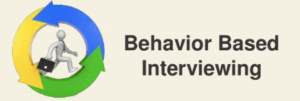Job Seekers
How to Ace the Behavior Based Interview
 It’s been around for a long time and is based on the theory that ‘past performance IS indicative of future results’, despite what your investment advisor might have told you. Many of the questions will begin with ‘tell me about a time when’, or ‘give an example where you’.
It’s been around for a long time and is based on the theory that ‘past performance IS indicative of future results’, despite what your investment advisor might have told you. Many of the questions will begin with ‘tell me about a time when’, or ‘give an example where you’.
For example, if a key part of a position is working as a part of a team, the question could simply be ‘give me an example of a time you worked on a team to solve a problem, and what happened’? The interviewer is not asking how you would handle working on a team in theory, but how did you work on a team, a much better predictor of how you will work within teams for them.
Before getting to the easy solution for handling these questions, let’s look at how the stress of an interview can affect you. Have you ever had an argument with someone that left you frustrated, and then later found yourself saying, ‘I SHOULD have said this or reminded them about that?’ But of course, in the heat of the moment that didn’t occur to you, because of complex body chemistry involving adrenalin and cortisol. So, if you are unprepared, a question like ‘talk about a time when you would have handled a situation differently with a colleague’ could leave you unable to think of a good reply.
Since there are an unlimited number of possible behavior-based questions, and you cannot prepare specifically for all of them, I want you to think of some interesting success stories in your career. You should come up with at least 3 (if you are very new in your career), or as many as 7-8 if you have had a lot of experience. Each of these stories should have a beginning, a middle, and an end, and have some specifics in terms of sales, cost savings, or other quantifiable benefits. Write them down, which will help engrain them in your memory.
These stories are now your library that you can draw on for virtually any question, whether the question involves teams, or personalities, or things that didn’t go well, or something you would have done differently, and so on. Many recommend the STAR method for a structured answer, which stands for Situation, Task, Action, and Result. Our candidates have thanked us for this one single piece of advice more than anything else over the years, after a successful interview.